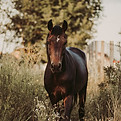Equine-Assisted Counseling
Equine-Assisted Counseling (EAC) is being created to meet the ongoing needs of slowing down, experiencing connection, and developing relational skills. EAC accomplishes these goals by using the natural mirroring abilities of a horse to build insight, learn how to give and receive genuine care, and overcome obstacles with and alongside a helper. For example, one may experience a horse mirroring their sadness or fear. Based on the horses response, one will learn how to accept and manage their own emotions and even learn new ways to interact in and through those emotions. Still sound a little strange? We know. See below to read more about specific characteristics that make horses unique helpers in counseling.

Prey Animals
This trait makes horses extremely aware of their environment, yet they demonstrate the ability to react accordingly. They can be calm amidst their awareness and protective when under real risk.

Family Structure
Like happy and struggling families alike, horses have a family hierarchy. They know the roles of their herd members and behave accordingly. This trait allows them to be good models for us, especially in setting appropriate boundaries.

Mirror Human Emotion
A horse can not only read your emotion, but they can also feel and express it. You may notice this in their body language (ears, eyes, sounds, and body posture).

Herd Animals
Just like humans, horses are created for connection. Once they form a relationship with you, they will be loyal and present for your work together. They thrive in relationship.

Large In Size
Just like many obstacles in life, horses are large (mostly) and are often viewed as scary or dangerous. Though when handled poorly they can be, they would rather be a resource to help, not hurt.

Nonjudgmental
Horses don't mind if you're a goat, dog, or person, they just want your companionship. Counseling requires us to dig deep into potentially hard places. Imagine working through challenges in completely non-judgmental environment.
